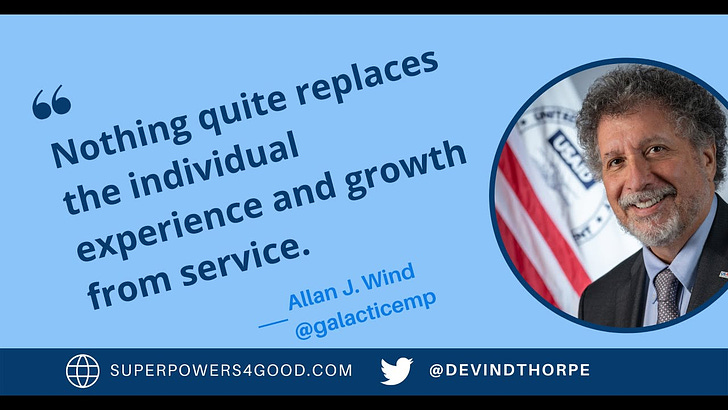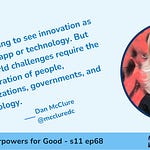This article is from the recording in the podcast player above and the video below.
Devin: I wonder, Allan, if you would share with us what you see as your superpower.
Allan: Well, that is really the magic question. I guess when it comes down to it, I’d have to say that I am always a glass-half-full kind of guy. I’d like to believe that my main superpower is an optimistic outlook on life. I do try to turn lemons into lemonade as the expression goes.
Jail Time
In his memoir, Andean Adventures, Allan J. “Alonzo” Wind shares a profound, if humorous, experience. I asked him to retell it:
That's a good reminder of the foolishness of youth. I was in college at the University of Chicago freshman year, a bunch of friends and I all getting alcoholically impaired as the case may be, and somehow we got to the idea of prank phone calls and we made a phone call.
I'm not sure I remember exactly where we were calling at this time, but I picked up the receiver and proceeded to try to put on some sort of horrible, phony East African accent, saying, This is Idi Amin and I come from Uganda, and I made some other comments along the lines of probably referring to an atomic bomb or something.
But it was just foolishness, freshman year drunkenness. And then we all kind of drifted back to our rooms in Pierce Tower, the nonexistent, thank god, dorm that I was in at that time—they've since torn it down—and got a knock on the door from the resident assistant with the police who had come in and proceeded to march me off to the Cook County lockup for making a bomb threat.
Scared the hell out of me. Spent the night in jail in the lockup until luckily I got off the next day with the help of the university lawyers with severe admonishment and really learning never to do that sort of thing again.
Peace Corps
After palling around politically with Rahm Emanuel in college in the late 70s, Allan felt activated by the environmental movement.
Allan says, “I always knew that I wanted to go into the Peace Corps, but my expectation was I would join the Peace Corps, serve two years as a Peace Corps volunteer after college, and then I would return to the United States.”
It didn’t work out that way.
I went to Peace Corps, and I found the experience of living poor, living with the campesinos, the farmer peasants in rural Ecuador, getting to know their daily routines, trying to help them address the sorts of health and nutrition challenges that came through their lives.
Ultimate, he’d spend virtually his entire career in service abroad.
While serving in Ecuador in his volunteer assignment, he became known to the Minister of Health of Ecuador. As Allan approached the end of his term, the Minister reached out to Allan’s boss at the Peace Corps to ask if he could extend Allan’s tenure for a year.
Acknowledging that he had become a bit of a thorn in the side of his boss, the official response was, “NFW, if you get my drift,” Allan says. (If you don’t recognize that acronym, you likely don’t want to know what it means, so don’t google it.)
So, the Health Minister connected Allan to Plan International (then called Foster Parents’ Plan), where he was hired as a local staffer, earning a modest salary that was still much more generous than his Peace Corps stipend.
“Peace Corps is really what changed the direction of my life,” he says.
Lessons Learned
Admitting that he learned the critical lesson of his career through the “school of hard knocks,” Allan says it is “the importance of truly listening to people reflecting on what they’re saying and what they’re not saying, appreciating them for where life has taken them and their levels of understanding.”
Allan takes some comfort in never having approached his international work in the model of a stereotypical “ugly American” behavior. Still, he admits, “I had probably more than my share of that sort of paternalistic, patronizing. ‘Oh, I’m an American. I know best,’ sort of thing.”
“I came to a very different understanding, or at least a more sophisticated, more nuanced understanding, of the importance of really listening to people, joining with them on a journey of growth and development and empowerment,” he says.
Even in emergency relief efforts that are sometimes vital for survival following a disaster, he sometimes sees adverse impacts from failing to listen. “Overly paternalistic approaches to addressing those kinds of emergencies can undermine the sorts of structures that you have in communities and delay a true recovery.”
In contrast, NGOs can help close gaps that a low-income country doesn’t have the resources to fill by working closely with and listening to locals. These gaps show in infrastructure, systems, education, training, food production and security.
Another lesson Allan observes from his career is that our country suffers from not having a national service obligation.
Reflecting on the impact of the Peace Corps on his life, he says, “Nothing quite replaces the individual experience and growth from service.” Much of the value of such experiences comes from living, working and socializing with people from different cultural and economic backgrounds.
Allan sees how his superpower, an optimistic outlook on life, has positively impacted his career.
How to Develop an Optimistic Outlook on Life As a Superpower
Having been through various challenges, he says, “I realize that it’s not always easy” to have an optimistic outlook on life.
His optimism enables perseverance, something he continues to leverage in volunteer work today.
While serving in the Foreign Service at USAID in Iraq, he saw his optimism yield measurable benefits. After an administrative snafu, he found himself looking for a post in Iraq and found or created an opportunity in Tikrit.
After some initial success, his military counterparts began to worry he was becoming a “bullet magnet.” A sniper began targeting them when he would visit the Tikrit University School of Medicine or the NGO Federation facility.
Still, he was optimistic that if he continued his work, the positive results would combat the sniper. It worked. “We were able to reestablish for Tikrit and for that province a lot of key activities, particularly in the area of farming and food production, which was invaluable,” he says.
Allan sees optimism as at least partially innate. Life experiences can help you develop it. The core of his advice is spiritual.
I think it requires conscious efforts and a certain amount of internal bravery to open yourself up and to show your vulnerabilities and to try to call out on whatever sort of divine spirit, divine spirituality that you find yourself called to ask for that sort of help. I think that whatever your religious faith, that ability to open yourself up and either through prayer or meditation or other spiritual teachings is really a key towards changing our hearts and allowing ourselves to be able to operate under circumstances we might not easily be able to do otherwise.
That thinking reflects in a small way another theme of his memoir, his conversion to the Baháʼí Faith.
By following his example and his recommended strategy, you can make an optimistic outlook on life a superpower that will help you do more good.

























A Night in Jail, Peace Corps Provided Formative Experiences for This Humanitarian